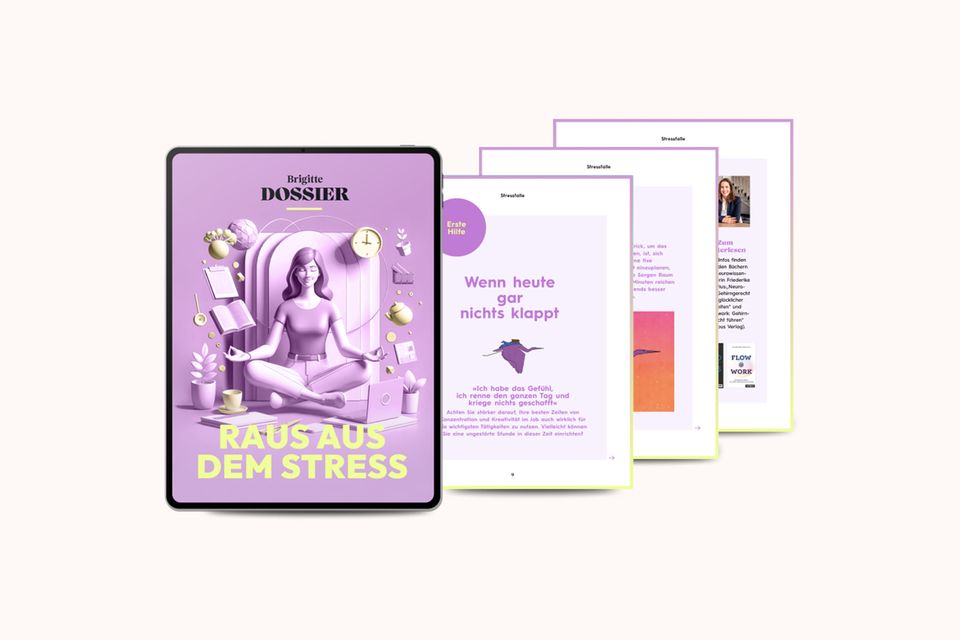Interview with Cordula Stratmann: "Humor is an attitude"

"Humor is an attitude," says comedian, author, and family therapist Cordula Stratmann. She explains how important it is to avoid bad moods, especially now.
BRIGITTE: Is it a mistake to think that comedy is not just a profession for you, but an attitude?
Cordula Stratmann: That impression isn't misleading. However, I have a hard time with terms like "comedy"; there was already comedy in the world before the term or genre "comedy" existed. It was already funny then! Comedy isn't about an industry, but about life itself.
To what extent is this an attitude? Can one choose to see things funny, to be cheerful?
I think life dictates this to us. If we're not stupid, we won't shut ourselves off from comedy. It's a life decision to accept life's offer of comedy. I advise against voluntarily choosing to have your mouth turned down. We urgently need the effort of darkness for friendly solutions!

Do you want to know how to better deal with stressful situations? Are you looking for routines that help you unwind? Do you want to finally fall asleep and sleep through the night? We answer these and other questions in our PDF dossier.
So a survival strategy?
Yes, and a very effective one! I think the idea that a bad mood is a natural reaction to difficult times is false. We can't afford to wallow in self-pity. We Germans tend to be thorough—even when it comes to pessimism. In doing so, we actively contribute to making the world a more difficult place. And complaining Germans, in my opinion, lack respect in light of all the crises that need to be addressed elsewhere. I don't deny anyone the right to react with concern to our current situation—but they shouldn't choose the worst possible antidote, namely chattering teeth.
So you are demanding more personal responsibility for your own mood?
Absolutely! It should mean not only seeing the good side of life, but being good ourselves. And that starts with small things: at the supermarket checkout, in the way we speak to others, and yes, even in choosing our government. Humanity is no longer a private issue, but a highly political one.
Are there things in everyday life that particularly please you?
Constantly! And just as many who could put me in a bad mood. I'm no magical creature with an ignorantly sunny disposition. But I choose to cultivate cheerfulness. It's a conscious training I've been undergoing since birth.
In your job as a systemic family therapist, you work with serious topics. How do you combine that with your sense of humor?
I don't have to combine anything because there's no contradiction. Sadness, cheerfulness, beauty, and horror always exist simultaneously. Some people ask me: Can you also be serious? That's like asking: Do you also breathe out after you breathe in?
Writing also plays a big role in your life. What does it mean to you?
For me, writing is like making music. I play with language and ideas, compose, and refine until it sounds meaningful.
In your work as a therapist, you assume that people can help themselves. What do you mean by that?
It starts with questioning your own perspective on life. The energy we use to suffer through things can also be used to change them. Self-reflection is key. We all have an inner voice that says, "This won't work" or "This sucks." If we give this voice a new job—from destructive to supportive—it changes everything.
You resumed your therapeutic work at age 50. Why?
I always knew I'd return at some point. I missed the work because it helps me just as much as it helps the people who come to me. What therapists practice with people is also practice for the therapists.
Was there also a concern that as you got older you would no longer be able to be seen on television?
It's absurd to reject aging. What's the alternative? Nevertheless, I find myself biting the table over a new wrinkle. Then I tell myself to stop: "Cordula, you're going crazy!" Recognizing that our lives are getting richer with each passing day—and not engaging in a battle we can't win—is a much more appropriate approach to the challenge of aging.
We're not living in a vacuum with this issue; there's the media, men, and other women who judge us. How do you experience female solidarity?
I've had great experiences with women. Women are courageous. They don't run away when it comes to inner work. They face things, they evolve. At the same time, however, I also have my problems with this new inundation of "body positivity" – we say goodbye to body shaming, but then tell ourselves that every woman is beautiful. Why do we torture ourselves with new superlatives? True togetherness means not only exploding affirmation, but also respectful confrontation.
So a revolution of connection – but without a soft focus?
Exactly. My best friends aren't the ones who just praise me, but the ones who ask me: Do you really mean it? Have you thought this through? That's solidarity.
Brigitte
brigitte





